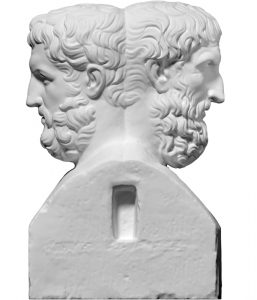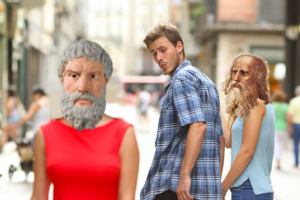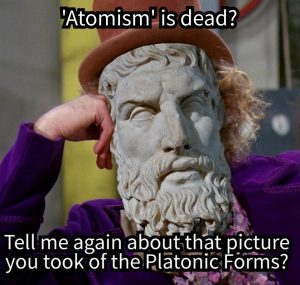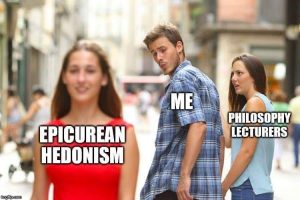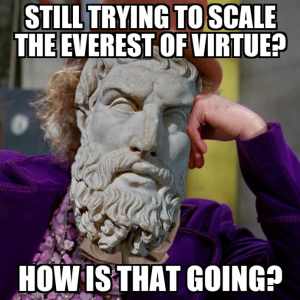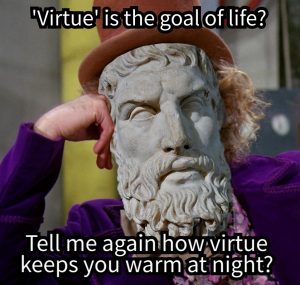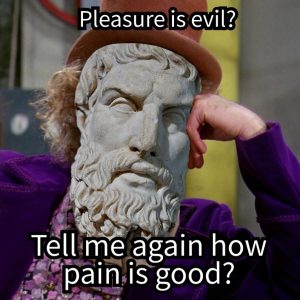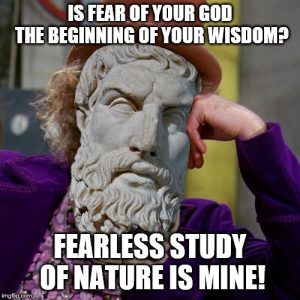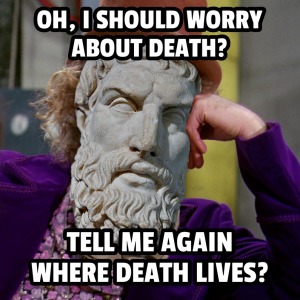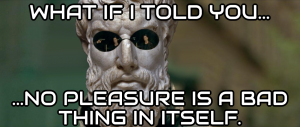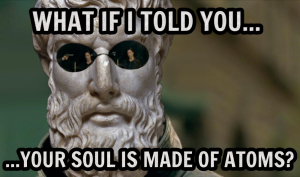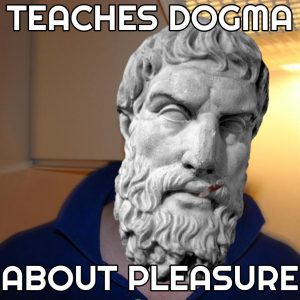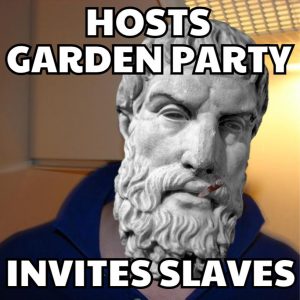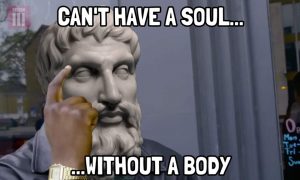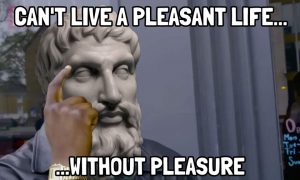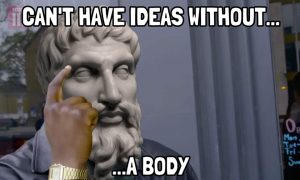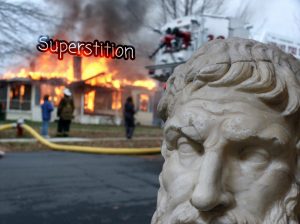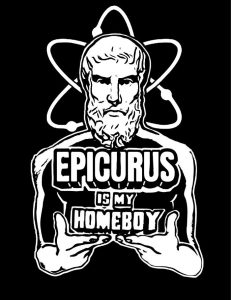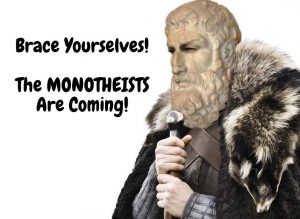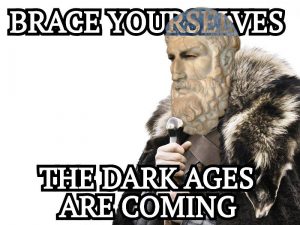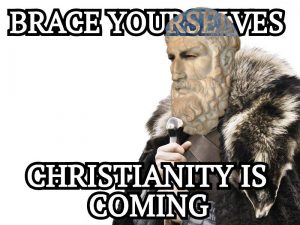The following is the translation of a chapter from the book Cosmos by Michel Onfray. Translated from the French by Ross Ragsdale. Edited for clarity by Hiram Crespo. The book was written by the eminent French intellectual shortly after the death of his father, and is an exploration of our place in the universe.
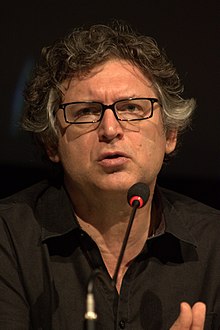 Ancient philosophy functioned as an antidote to my Judeo-Christian education. I was intellectually, spiritually, and ontologically prepared by Roman Catholicism; it was hard for me to believe, at the age of 17, that we could not be moral without being Christian. Of course, I understood that being Christian did not in reality imply being moral: examples of vindictive priests, sadists, perverts, gropers of young boys, had proven that to me early on. The wrath of the parish priest of my hometown, the brutality and pedophilia of the Salesians that I endured in an orphanage, if not the immoral behavior of local figures who would go to the Sunday Mass … all this made up what I already empirically knew, that there existed a gulf between calling oneself a Christian and actually being one.
Ancient philosophy functioned as an antidote to my Judeo-Christian education. I was intellectually, spiritually, and ontologically prepared by Roman Catholicism; it was hard for me to believe, at the age of 17, that we could not be moral without being Christian. Of course, I understood that being Christian did not in reality imply being moral: examples of vindictive priests, sadists, perverts, gropers of young boys, had proven that to me early on. The wrath of the parish priest of my hometown, the brutality and pedophilia of the Salesians that I endured in an orphanage, if not the immoral behavior of local figures who would go to the Sunday Mass … all this made up what I already empirically knew, that there existed a gulf between calling oneself a Christian and actually being one.
It is probably during this time that my distrust of words and my decision to judge according to the facts had been born. Smooth talkers, rhetoricians, sophists, verbose men, and orators immediately collapse against this extremely straightforward yardstick. In contrast, many modest, discreet, taciturn individuals prove to be the heroes of common life, for, without saying so, they do good around them. Secular sanctity exists. I’ve met her …
I loved learning that one could be moral without being a Christian. This was taught to me by my old master, Lucien Jerphagnon, who gave an epic account of Lucretius’ Roman Epicureanism. I discovered On the Nature of Things as an existential support from which I could organize my life while attempting to develop it properly, while honoring the Roman values of friendship, civicism, integrity, the given word and moral conflict. And then, discovering the rotundity of the earth–I was only seventeen years old, and one is quite serious when one is 17–I understood that pre-Christian thought provides a precious ore for a post-Christian philosophy, for at the time of Lucretius, (modern) fiction is in distant emergence.
I loved that an answer to the problem of death responded to the existential crisis of my time. This simple, succinct, efficient, frighteningly efficient, that where I am, death is not, and where death is, I am not, immediately convinced me that the event of death was not the idea of death, that the former is less present in a life–for death can be brief, immediate, sudden–and the latter can pervert actual death through anxiety, fear, worry, dread. We must live, while awaiting the day that shall not fail to occur but lacks immediate reality. The true certainty lies not in the existence of a life after death, but that of a life before death, a life of which we must make the best use.
Whence Epicurean hedonism. The Roman Epicureanism of Lucretius, its Campanian method, its belated truth with Philodemus of Gadara or Diogenes of Oenoanda, give Epicurus’ Greek Epicureanism another appearance. Nietzsche is right to say that philosophy is an autobiographical confession; that of Epicurus was the thought of a sick, fragile man with a weak body distorted by extremely painful kidney stones during a period that was unaware of any effective sedation. This is why his hedonism is austere, ascetic, minimal, and defines itself by the absence of pain. To refuse to satisfy all desires, (focusing mainly on) those of hunger and thirst, then to make of this satisfaction the peace of the body, therefore the peace of the soul, this links the hedonism of Epicurus to a wisdom of renouncement.
On the other hand, the Roman Epicureanism of Lucretius turns its back on the Greek formula. We are unaware of the biography of this Roman philosopher. We can barely affirm that he was a knight during the first year of the Common Era, but from his work we can deduce that his body was one of great health. Lucretius does not wish to define ataraxia as solely the satisfaction of necessary and natural desires; he wishes that all desires be satisfied if they are not repaid by a greater displeasure.
Where Epicurus thinks that quenching thirst and hunger is done with water and a bit of bread, Lucretius does not exclude what constituted the basic menu of the Herculaneum Epicureans whose Villa was found decorated with philosophically edifying works of art: sardines fished in the Mediterranean, olive oil produced with fruits from the garden, fish marinated with citrus from the orchard, butter, milk, cream and eggs from the farm animals, lamb’s meat grilled with the vine from which they would make fresh wine, bread made with the wheat from the surrounding fields. Roman Epicureanism–which was more practical, more empirical, livelier than Greek Epicureanism–appeared to me in my youth as an ontological Mediterranean sun.
The founder’s Greek Formula forbids (1) sexuality: for Epicurus, the libido is inscribed in the logic of natural desires, common to both humans and animals, but is unnecessary. Unncessary, for not satisfying sexual desire does not impede upon the life of the individual being and does not prevent the being from persevering in his being. We appreciate the pro domo advocacy from Epicurus, for whom sexual vitality should not be more powerful than non-sexual vitality. At 17 years old, when we have neither Epicurus’ modest body nor his modest health, Lucretius appears more satisfying.
On the Nature of Things does not forbid sexuality, unless its practice must be repaid by inconveniences that disturb the sage’s wisdom. Therefore, there isn’t a deontological posturing from Lucretius (a common characteristic of Roman thought), but rather a consequentialist affirmation (a character trait from Roman thought): if sexual desire troubles the soul, one should satisfy the desire; if this enjoyment is repaid by a displeasure, one must renounce it; if, on the contrary, the trouble of the desire resolves itself through pleasure, then we simply give free rein to our desire. Lucretius affirms that we are sexual beings, that sexuality is neither good nor bad, that her exercise need not produce disagreements that impede the sage from exercising his discipline. The Roman philosopher imagines a concrete life with a concrete sexuality for the concrete man where the Greek sanctity of Epicurus places its ethics on summits unattainable to the sage unless he renounces the world … to truly live as an ectoplasm (1).
What I did not see at the time when I first read Lucretius is the consolatory philosophical role he gives to science. It’s only today that I understand it. The Epicureans do not concern themselves with useless knowledge in order to lead a philosophical life. No taste for idle speculations, pure theory, intellectual rhetoric, disembodied speculation: they think in order to produce the happy life. Science herself is no exception to this logic: the atomic theory, physics, the knowledge taught in the letters to Pythocles and Herodotus, aim for nothing more than pacifying doubts, crushing fear, and evaporating anxiety.
During my discovery of Epicurus, I was saddened to learn that only 3 letters remain, of which only one was devoted to ethics. The university only ever teaches the history of philosophy, but never the history of the history of philosophy. No one said that we owe the increasing scarcity of Epicurus’ complete work–who, according to Diogenes Laertius, had written more than 300 books–to the Judeo-Christian fury, which declared the ancient materialism null and void.
Walking the walk and talking the talk (joignant le geste et la parole), the Christians had succeeded in what Plato had dreamed: a great metaphorical inferno for works incompatible with idealist, spiritualist, and religious fictions. Hundreds of thousands of sheep were slaughtered to tan the skins on which were recorded the texts of the Christian sect, and atomistic thought was scraped; its leathers became scrolls for the plethora of gospels, or were erased, neglected, vilified, forgotten, insulted, caricatured, despised. Three unfortunate letters have survived this barbarous massacre from the followers of the love of neighbor.
These three letters, by chance, were summaries of the complete work for the disciples: dense and clear compendiums of what to remember, to teach to practice Epicurism. The Letters to Herodotus and Pythocles distressed me: what good are all these considerations on sounds, bodies, emptiness, arrangements, simulacra, perception, vision, celestial phenomena? And what of these claims that “nothing comes from nothing”, that “the universe is infinite”, or that teach the eternity of movement and other detailed considerations on the forms of the worlds, or that teach of the inifity of the worlds, of the true nature of eclipses, of meteors, of the movements and lights of the stars, of the variation in the duration of day and night, meteorology, light, thunder, lightning bolts, cyclones, tornados, earthquakes, hail, snow, dew, ice, the rainbow, the halo around the moon, the comets, stars that turn around one spot, those that wander in space–the shooting stars?
Impatient, I wanted existential recipes here and now, practical and practicable wisdoms, life skills, some concrete spiritual exercises. But I had not seen that a more careful reading of Epicurus would have dissipated my first movement: the materialistic physics lays out a concrete ontology, and forbids the foolishness of a metaphysics apart from physics. In other words, Epicurus forbids a religion that hides its name (2) and talks to us about essences, concepts, ideas to better bring us back or lead us to God, and (he forbids) the worlds of servitude that this legitimates, explains, excuses, and justifies.
Epicurus writes that scientific knowledge exempts us from subscribing to irrational cruelty. To advance knowledge is to contribute to the decline of the misunderstandings with which the legends, the fictions, the fables with which religion is nourished are formed. If we know that, in the sky, there is only matter, multiple atoms; if we discover that the gods are material and that, free of troubles, experiencing ataraxia, they function as models of practical wisdom, then we empty the sky of the gods of faith and theology, we stop submitting to false powers invested with false authority over men.
Science worthy of its name–the grammar suggests that it is a transcendental Epicureanism–undermines religion, when understood as superstition, that is: a belief in false gods. The only true gods are material and their divinity resides in their subtle constitution and singular arrangements. In the letter to Pythocles, after having spoken about lightning and its impact–once considered sacred because it had been designated by the gods to send messages to humans–Epicurus gives his version (of what it is). The atomist philosopher summons materialistic explanations: gatherings of swirling winds, conflations, the rupture of a part of their mass, their violent fall, the density and the compression of the clouds, the dynamics of the fire, the interaction between the celestial movements and the geology of the mountains. Then he concludes his concrete analysis of concrete phenomena: “Let only myth be excluded!”
“Let only myth be excluded!” This is the categorical imperative of what I call a transcendental Epicureanism. I am not usually a supporter of the transcendental, because the word is often used as ontological “fig-leaf” for the sacred, for the divine, for the immaterial, for the religious! I retain from this word the meaning which Littré attributes to it: “that which relies on data superior to sensible impression and observation” (3). In other words, there was a historical Epicureanism, dated, inscribed in dates, with philosophers, works, names, and books. The disciples of Epicurus found the word and the meaning.
Let us start from the diversity of Epicureanism: that of the contemporaries of the founder, and of the others who came later, such as Diogenes of Oenanda–from the 4th / 3rd century BCE to the 3rd century AD. Let us note that there was more than half a millennia of Epicurean philosophy in Greece, in Rome or Herculaneum, and elsewhere in Asia Minor. Some adherents were contemporaries of the decadent Athenian city, others of the conquering Roman Empire. Let us conclude that, notwithstanding the differences, there is a powerful constitutive force of Epicureanism, an energy that will, moreover, subtly nourish the current of intellectual resistance to Christianity.
I call transcendental Epicureanism this force which crystallizes around a certain number of untimely and unrealistic theses. The world is knowable; knowledge is the architect of happiness; happiness supposes the emancipation from all mythologies; mythologies are the only antidote to monistic materialism; monistic materialism fights religions; religions thrive on ascetic ideals; the ascetic ideal invites one to die in the world in his lifetime; to die in the world while alive is worse than truly dying one day; one must prepare to truly die one day; this preparation supposes philosophy–which is true knowledge of the true world, and recusal of fables and fictions. Da capo (4).
This transcendental Epicureanism now assumes that philosophy, so often lost in the worship of the pure verb, revives the Epicurean tradition of taste for science. Admittedly, science has become complex, specialized, fragmented, difficult to understand for a non-specialist. Rarely can a man anymore–like Descartes–be both a brilliant philosopher and also an inventor who leaves his name in the history of science. But the impossibility of knowing everything about the science of one’s time does not prevent us from knowing enough to stop saying nonsense about the world in general or about a particular subject.
The central questions in droves of considerations by contemporary philosophers–on bioethics, global warming, genetic engineering, natural gas, transgenesis, genetically modified organisms, patentability of life, biodiversity, cloning, the greenhouse effect–often come from the deontologist discourse. This resorts to the methodology of fear, which is dear to Hans Jonas, since it requires tapping into healthy reason. Magical thinking often feeds the rhetoric of catastrophism, which allows for a disconnected discourse of science. Ignorance of what science permits leads to a theoretical delusion that thinks more about science fiction than about science without fiction.
Materialists and atomists, Democritus and Epicurus thought from the information provided by their empirical intelligence. The ray of light in which suspended particles dance gives the intuitive impulse to a concrete physics that leads to an ethics free of deities. A transcendental Epicureanism requires use of the information that science can provide to avoid delirium purely and simply. In this configuration of timeless Epicureanism, the transcendental proves to be a remedy for transcendence.
Let’s ask astrophysics to provide an ontology that can illustrate what transcendental Epicureanism could be—in preparation for an ethics of ataraxia. We would discover that the atomistic intuitions of twenty-five centuries ago are globally corroborated by recent scientific discoveries in the field–whereas for the past two thousand years, science has never confirmed a single Christian hypothesis, and has furthermore invalidated them all: geology downgrades the Christian thesis of the world’s age, as astronomy does with geo-centrism, psychology challenges the thesis on free will, Darwinian naturalism dismantles the thesis of the divine origin of man, astrophysics that of the creationist origin of the world, etc.
On the other hand, the contemporary sciences validate many epicurean intuitions: the monism of matter; (when) reduced (to their minimal components), things are made up of pure and simple material combinations; the eternity of matter; the temporality of its arrangements; the inexistence of a void in a configuration where nothing is created from nothing, and nothing disappears into nothing; the alternating dynamic of decomposition and recomposition; the particle as a primordial element present in all existing things; the infinity of the universe, therefore of space; the existence of a plurality of worlds; the perishable character of our universe, which has come into being, is and will disappear; the ordering of the cosmos in reducible order to a mathematical formulation and to the laws of nature–all without a God or Creator.
Here is what we know about the cosmos as told by Jean-Pierre Luminet (henceforward, JPL), whose hypothesis of a crumpled universe seduces me. JPL is an astrophysicist, certainly, but also a music lover, musician, poet, writer, novelist, cartoonist, to whom must be added pedagogue, lecturer, professor, researcher. He resembles those men of the Renaissance who are by no means impressed by the universal, and who idly travel in all the intellectual worlds seemingly detached while unveiling all that is. JPL operates at the level of the big leagues, Galileo, Kepler, Newton, Einstein, but our era does not like its geniuses.
JPL quotes the philosophers, certainly. He knows well the philosophy of science, and happily moves in all the worlds: from the poetic cosmological thought of the Presocratic ones, to the hardest physics of the contemporary researchers while passing by the classics, from Plato to Leibniz, from Nicolas de Cues to Giordano Bruno, from Copernicus to Typhoon Brahe, from Einstein to Riemann, from Gauss to Lobatchevski, but he manifests a particular fondness for the atomist of Abdera (Democritus), Epicurus and Lucretius, and their brilliant intuitions.
In the field of astronomy, the last thirty years have brought more than the last three millennia. Specialization of observation equipment brought about the advent of new concepts. Hence the astonishment to find that the finest apex of discoveries coincides with the empirical hypotheses of the materialists who, watching the dance of dust in a ray of light, construct a world, a universe, a cosmology, an ontology always from the point of view of foundations.
If the philosopher deduces the nature of reality from a few grains of dust, the astrophysicist specifies things. Originally, the universe is a compound of gas and plain dust floating between empty space and stars. There is no sun yet. In this nebula are all the atoms discovered by the materialists: which constitute the planets of the solar system, the earth and all that is on the earth, the human bodies–even myself, who am writing this book and you, who are reading it–everything under your gaze at the moment you read, and when you lift the head from these pages, all this is a compound of atoms floating in the nebula that has engendered us. The monistic truth cannot be better said: from the flea to the planets, from the giant squid of the underwater world to the stars, from the woodworm dear to the philosophers for their demonstrations, to Darwin who expounds the law of evolution in the animal kingdom, from the blade of grass to the galaxy, everything comes from this protostellar nebula solicited by the explosion of a supernova, a very large star, whose shock-wave shakes the balance of the nebula that collapses on itself, and causes chain reactions, giving birth to the sun–this light that nourishes planet Earth.
The mass of gas turns on itself, it contracts, the rotation accelerates, the cloud flattens and takes the form of a disk that makes possible the accretion, in other words the conglomeration of small bodies to form bigger ones until, from tiny dust, come the planets, including the earth, then man … the effects of gravity affect this movement of collapse of the Star on itself. For millions of years, these movements of accretions multiply.
Could not we find a scientific, physical, astrophysical formulation of what Epicureans call the clinamen? When Lucretius explains that everything is composed of atoms, to then explain that we went from a multitude of atoms that fell in the void, to the composite bodies (we have now), he resorts to this scientific hypothesis which proves to be an excellent scientific intuition: the poetic postulate of the swerve (clinamen): the declivity of an atom which encounters another which makes the aggregation of what is possible, this poetic postulate, therefore becomes a refined scientific formulation under the pen of the astrophysicists.
The sun that makes life possible on earth therefore has a date of birth: before it the universe was, after it the universe will be. When the latter happened, the universe was already 9 billion years old; its time is running out, it will last another 5 billion years. Before it, man was a potentiality without consciousness to think it; after it, man will not even be a memory, since no consciousness will be there to carry its memory. Man will have undergone an event in a huge atomic conflagration. But this event is believed to be everything and the center of everything, while it is buried in what is, in the same way as we see in stones and glaciers, volcanoes and storms, halo and rainbows.
To remain local and modest to our universe, JPL claims that it is finite but boundless, creating an oxymoron, since the end assumes the limit, limits an end, and that one cannot be finite and limitless. (He is referring to) a three-dimensional Euclidean space, of course, because, in this configuration, our conceptual and mental habits force us into a certain type of representation. But in a non-Euclidean space, the oxymoron disappears in favor of a new mental figure which allows, for example, if one is in a cube, to go out through the ceiling and thus to enter (another cube) through the floor.
This change in spatial paradigm makes it possible to solve a number of problems, including that of the shape of the universe. JPL says it is crumpled. In other words, much smaller than we imagine, and refracted by a device that makes us take for greater that it is. The real, at least what appears to us as such, is an immense combination of fictions, in this case optical illusions, topological mirages, ghosts. Lucretius held for an infinite universe because he wondered what would become of a javelin launched towards the finite at the moment when it would reach the limits of the universe: would it stop? Break against potential walls? But behind these walls of a finite world, what exists? And how do we name what would exist after the limit of the finite? Non-Euclidean geometry makes it possible to solve the problem: Lucretius’ javelin thrown towards the infinite would go infinitely into this finite but limitless universe: perpetual motion, eternity by the stars.
JPL explains that what we observe deceives us: different ages seem to us like the same time. The fossil radiation of the universe assumes that all our information about it is given by the light that reaches our gaze distorted by the force that structures the universe. Light does not move except by gravitation. So the straight line is not the shortest way. Gravitation digs an abyss of forces, which become the course of light and make it write singular partitions: many lights, divided in time stages over millions of years, reach the observer at once. The multiplicity of light-times merges into a single observation time. So that we think that the same thing at different stages is multiple things, as if we were taking a character we see in ten thousand pictures from their conception to their death, and imagining him as different individuals. These gravitational mirages show that vastness is not so vast, as much as one might think it is after seeing it.
JPL takes the example of a space whose interior would be lined with mirrors that would reflect a single candle: we would see as much as the refractions would allow, and yet it would be only the flame of a single candle as many times duplicated as there are mirrors. Real space is much smaller than the observed space. This universe is crumpled: a kind of mirror game enlarges a small representation. Our universe is a baroque theater.
This world is small, but there are many of them, and astrophysics speak of the multiverse. Our universe would have detached itself from the quantum vacuum to obey its own temporal clock and its singular spatial geometry while the multiverse would live outside space and time by aggregating universes incessantly in formation with their times and their spaces. This is totally novel and absolutely inconceivable for a brain formatted in our space-time.
Epicureans believed in multiple worlds and material gods between the worlds. Totally devoid of human form, of human feelings, their subtle atoms would embody a model of ataraxia which Epicurus called to imitate: the ataraxia of the sage was therefore shaped by the gods of the cosmos. The gods were anthropomorphic neither in form nor in substance, just ideal forms that could be activated as models of wisdom, which was reduced to pure pleasure of existence. (5)
But the intermundia are validated by astrophysics: they are black holes that are defined as a force of such gravity that it absorbs everything that comes within reach, it ingests and digests material, even light. Time dilates, matter decomposes and is absorbed, light rays deviate. The boundaries that delimit black holes are called “event horizons” because we cannot observe anything beyond them. There is no interior and exterior, no space and time, and all is reversed. Near this horizon, space turns like a glove. It is distortion of space-time.
Some say that the bottom of the rotating black hole is not a dead-end and that there are “worm holes”, which are kinds of tunnels that corresponding with other universes. We can also imagine “white fountains” that would be the opposite of black holes, which would not absorb but would spout matter engulfed by black holes. The bigbang would then be a huge white fountain perhaps connected to another universe that would have dumped some of its matter in our own universe. That’s how we are here.
The Epicurean atoms of the protostellar nebula, the clinamen as a poetic intuition of the astrophysical phenomenon of accretion, the Lucretian javelin launched towards the infinite which discovers its trajectory drawn by the astrophysics of JPL, the plurality of Epicurean worlds validated by the multiverse of the discoverers: here is evidence that a contemporary transcendental Epicureanism is possible or conceivable, and that physics–in this case astrophysics–is an introductory course to ethics.
Obviously, we see that the Judeo-Christian sky filled with angelic trinkets, paradisiacal fiction for glorious bodies, is outclassed by the assumptions of astrophysical science. This field of science claims its modesty: we know almost nothing about the universe and the cosmos. But what we are beginning to know forces us to revisit our conceptions of freedom, free will, choice, responsibility. Anyone who can reason understands that we are fruits of nature.
But we are also fruits of the cosmos, and this is much less evident to the mortals who often ignore the discoveries of the most recent astrophysics. The latest work on Higgs’ boson–which was finally discovered–should compel the latter-day theologians to surrender arms and instead consider retraining in ontology, provided it is materialistic. The heavenly Judeo-Christian hodgepodge, even when we no longer believe it literally, left traces in the soul shaped by more than a thousand years of ideology.
Magical thinking still exists in millions of human brains: from creationists to New Age shamans, from neo-Buddhists to Muslim theists, from custom-made monotheists from planetary megacities to spiritualism, from the anthroposophy of the proponents of biodynamic agriculture, devotees of Shinto spiritual creatures who invoke the gods of the lawn before carving them, from supporters of many sects–like the Raelians–who think that only the cloned will be saved and admitted into the spaceship that will ensure salvation to vodouisants and other African-American cults, there is no shortage of supporters of the supernatural recycled in religion after religion.
A materialistic ontology leans on this transcendental Epicureanism which recalls the link between man and nature, certainly, but also between man and the little we know of the cosmos. Let’s tap into our ability to enjoy the spectacle of this immensity, which presupposes the sublime: the sublime is the path of materialistic, atomistic, atheistic access to the oceanic feeling that brought the body back into the configuration that existed before the Judeo-Christian separation (from nature). The lessons given by the sublime activate in the being a force that was neglected, despised, vilified, hunted down by monotheisms. Renewing the search for it according to hedonistic logic, allows a post-Christian ethics in which transcendental Epicureanism plays a significant role.
Notes:
1. Here, Onfray seems to make Epicurus seem more austere than he was. Most contemporary Epicureans would not accept the view that Epicurus forbids sexuality. In the sources (See Vatican Saying 51), he merely warns about the potential dangers of sexuality to be mindful of.
2. When referring to a “religion that hides its name”, Onfray perhaps refers here to Christianity as nothing more than Platonism.
3. In other words, by setting “Let only myth be excluded!” as the only non-empirical source in his epistemology, Epicurus set a new, scientific boundary for ultimate, transcendental reality, one which supplies us with many of the same cosmological underpinnings that people find in religion.
4. “Da capo” means “from the beginning”; that is, “and back to the beginning”.
5. Here, it sounds like Onfray is combining the realist and idealist interpretations of the Epicurean gods.
Further reading:
Cosmos (in French) by Michel Onfray

by Julien Offray de La Mettrie.

